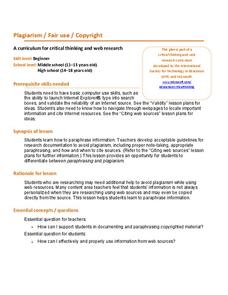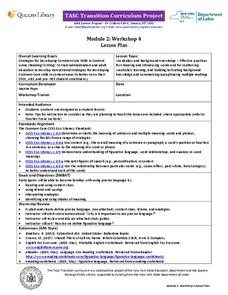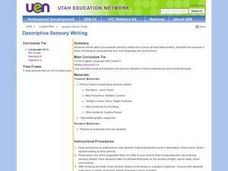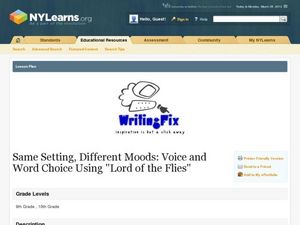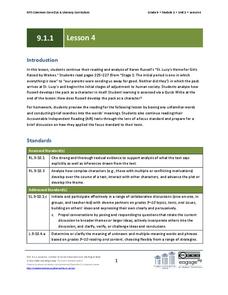ReadWriteThink
Style-Shifting: Examining and Using Formal and Informal Language Styles
Your high schoolers are probably versed in two languages: formal language, and informal conversation. Help them identify the correct language style for their audience and context with a thorough lesson and examples of different speech...
PBS
Copyright and Fair Use
When is using someone else's copyrighted material appropriate? Learn about copyright and fair use with a lesson from PBS.org. Scholars read through a reference sheet about authors' rights and users' rights, and then create posters for a...
Curated OER
Writing and Presenting a Fable Using Research
Elementary and middle schoolers research animal facts and use them in a fable. First, they pair-share to find animal traits to use in writing a fable. They then complete a prewriting worksheet. After going through the writing process,...
Microsoft
Plagiarism Fair Use Copyright
Nothing makes junior high and high school teachers more frustrated than plagiarism. Instruct young writers about copyright laws and the correct ways to paragraph information without copying the exact words. A set of secondary-level...
EngageNY
Using Multiple Resources of Information: Creating a Cascading Consequences Chart about DDT and Practicing a Fishbowl Discussion
For every action there is a consequence. Scholars continue their work on creating a cascading consequence chart about DDT using Welcome Back, The Exterminator, Rachel Carson: Sounding the Alarm on Pollution along with graphic organizers...
EngageNY
Writing to Inform: Analyzing a Model Using a Rubric
Learn to write right. Scholars analyze the model essay Adversity Faced by Townspeople in the Middle Ages. They discuss the essay and make annotations working with an elbow partner. Learners then take another look at the essay using a...
New York State Education Department
TASC Transition Curriculum: Workshop 4
Why is it important to use precise language? Participants explore this question in the fourth activity in a series of 15 on effective instruction. Perfect for all content areas, the activity promotes appropriate language choice through...
Curated OER
Watch What You Say!
Explore how to use appropriate language for a variety of real-world settings. Here, middle schoolers determine the audience for various types of magazines, and identify words that are appropriate for various friends and family members....
Curated OER
Descriptive Prompt: Precise Language
Incorporate sensory details into a piece of descriptive writing. First, elementary and middle schoolers improve a piece of writing by using precise, vivid language, as well as appropriate word choice. They then listen to a variety of...
Curated OER
It's Raining Cats and Dogs! Literary Devices and Figurative Language
Third and fourth graders study literary devices and figurative language. They view a PowerPoint presentation (which you must create) to review hyperbole, idiom, simile, and metaphor. They read and discuss the book There's A Frog in My...
Curated OER
Using Personification
Young readers listen to the story The Three Little Pigs, and discuss what abnormal characteristics the pigs and the wolf have. They relate these characteristics to personification, and practice writing sentences using personification.
Curated OER
Use of Personification and Imagery in Poetry
A reading of Theodore Roethke’s dark "Root Cellar" and Sylvia Plath’s more abstract "Mirror" launches a discussion of imagery and personification in poetry. After finding examples of personification in the poems, class members craft...
Curated OER
Using Similes and Metaphors in Poetry
The use of similes and metaphors will become more clear and your students will gain knowledge and comprehend the meanings of the words with these activities. They compose interesting similes and metaphors based on visual prompts and...
Curated OER
Linguistic Diversity. Languages in Canada - Elementary
Create a language mosaic to reveal the linguistic diversity in your community. Pupils interview a person with a home language other than English and contribute to a bulletin board display representing the variety of languages spoken. The...
Curated OER
Using the Sounds of Words Reading Task
Young readers demonstrate phonemic awareness in words and blends, and recognize 100 high-frequency words. Use a nursery rhyme to point out rhyming words, and change the words by putting a new letter at the beginning. Each learner will...
Curated OER
Reading Text with Appropriate Phrasing and Proper Expression
Practice reading with expression and appropriate phrasing with a scaffolded lesson. There is a detailed script here for you, but you could easily use it simply as an outline. Begin by modeling effective reading by displaying a large-text...
Curated OER
Language Arts: Scavenger Word Hunt
Participate in a scavenger hunt to find objects beginning with a particular letter sound and take digital photos of them with your scholars. Using software, they find word pictures beginning with particular letters and locate picture...
Curated OER
Same Setting, Different Moods: Voice and Word Choice Using Lord of the Flies
Whether it's dark, delightful, or somber, set the mood with William Golding's Lord of the Flies. High-schoolers practice descriptive writing by creating the appropriate mood for an original scene, starring one of the book's main characters.
Curated OER
The Stuff of Stories: Using Museums to Inspire Student Writing
Middle schoolers write descriptions, narratives, and dialogues based on objects of art and time periods in a museum. They base several writing assignments on art objects and paintings, including a literal description and an emotional...
Curated OER
Two Sides, Same Coin: How Political Beliefs Influence Language Use
Learners read several magazine articles on the same topic written from different political perspectives, paying particular attention to the diction, syntax, and arguments presented in support the point of view expressed. They then select...
EngageNY
Grade 9 ELA Module 1, Unit 1, Lesson 4
Connect with the text using helpful annotation strategies. As your class reads the first section of Karen Russell's short story, "St. Lucy's Home for Girls Raised by Wolves," they note important passages that establish character...
Curated OER
Finding Your Way Using QR Codes
If you are taking your class on a library tour, use this scavenger hunt activity to spice it up. Although this hunt isn't actually attached (like the lesson says it is), you will get a good idea of how to implement a task like this....
Curated OER
Find Figurative Language
Meet with the school library specialist and work together to plan a visit and presentation on figurative language. After defining and examining examples of targeted terms, the class travels to the library where the SL has collected...
Curated OER
Making an Argument: Effective use of Transition Words
Work on using transition words in context by prompting elementary and middle schoolers to write their own persuasive essays using transition words. They explore new forms of transition words and examine how they are used in an editorial...





